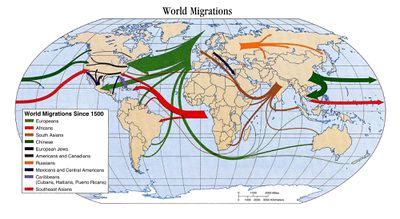Difference between revisions of "ISSS608 2016-17 T3 Group5 Immigration Intro"
Xqchen.2016 (talk | contribs) |
Xqchen.2016 (talk | contribs) |
||
| Line 34: | Line 34: | ||
==Motivation of the Application== | ==Motivation of the Application== | ||
| − | Migration is a big issue in the international relations and foreign policy. As a phenomenon, migration is not new, and people have been moving from place to place since the dawn of time. Migration could be either permanent or temporal. At a more general level, the causes of migration are varied, ranging from social, political, to economic reasons. Theories of migration tend to focus on push-pull factors of source and destination countries. However, any migration flow is both a product of these factors as well as the relevant immigration policies of regulating cross border flows. Given all these factors, it is difficult to study the determinants of migration. Nevertheless, migration remains a very important topic of study today. In recent years, anti-immigrant sentiments has been growing particularly in the more developed West. Driven by fears of displacement, competition for jobs and dilution of national and/or ethnic identity amongst local populations, the issue of migration has been much politicised. The wave of popular dissatisfaction with migration-related issues have even resulted in Brexit and the Election of President Trump. Yet, migration is one of the building blocks of an international economy and having the ability to cross borders is a key factor in building up the economies of both sending and receiving countries. Understanding the factors that affect the causes and the flows of migration provide an important lens in interpreting the landscape of the international political economy. | + | Migration is a big issue in the international relations and foreign policy. As a phenomenon, migration is not new, and people have been moving from place to place since the dawn of time. Migration could be either permanent or temporal. At a more general level, the causes of migration are varied, ranging from social, political, to economic reasons. Theories of migration tend to focus on push-pull factors of source and destination countries. However, any migration flow is both a product of these factors as well as the relevant immigration policies of regulating cross border flows. Given all these factors, it is difficult to study the determinants of migration. Nevertheless, migration remains a very important topic of study today. In recent years, anti-immigrant sentiments has been growing particularly in the more developed West. Driven by fears of displacement, competition for jobs and dilution of national and/or ethnic identity amongst local populations, the issue of migration has been much politicised. The wave of popular dissatisfaction with migration-related issues have even resulted in Brexit and the Election of President Trump. Yet, migration is one of the building blocks of an international economy and having the ability to cross borders is a key factor in building up the economies of both sending and receiving countries. Understanding the factors that affect the causes and the flows of migration provide an important lens in interpreting the landscape of the international political economy. [[file: Motivation.jpg|thumb]] |
Revision as of 16:53, 5 August 2017
|
|
|
|
|
|
|
Overview
Motivation of the Application
Migration is a big issue in the international relations and foreign policy. As a phenomenon, migration is not new, and people have been moving from place to place since the dawn of time. Migration could be either permanent or temporal. At a more general level, the causes of migration are varied, ranging from social, political, to economic reasons. Theories of migration tend to focus on push-pull factors of source and destination countries. However, any migration flow is both a product of these factors as well as the relevant immigration policies of regulating cross border flows. Given all these factors, it is difficult to study the determinants of migration. Nevertheless, migration remains a very important topic of study today. In recent years, anti-immigrant sentiments has been growing particularly in the more developed West. Driven by fears of displacement, competition for jobs and dilution of national and/or ethnic identity amongst local populations, the issue of migration has been much politicised. The wave of popular dissatisfaction with migration-related issues have even resulted in Brexit and the Election of President Trump. Yet, migration is one of the building blocks of an international economy and having the ability to cross borders is a key factor in building up the economies of both sending and receiving countries. Understanding the factors that affect the causes and the flows of migration provide an important lens in interpreting the landscape of the international political economy.

